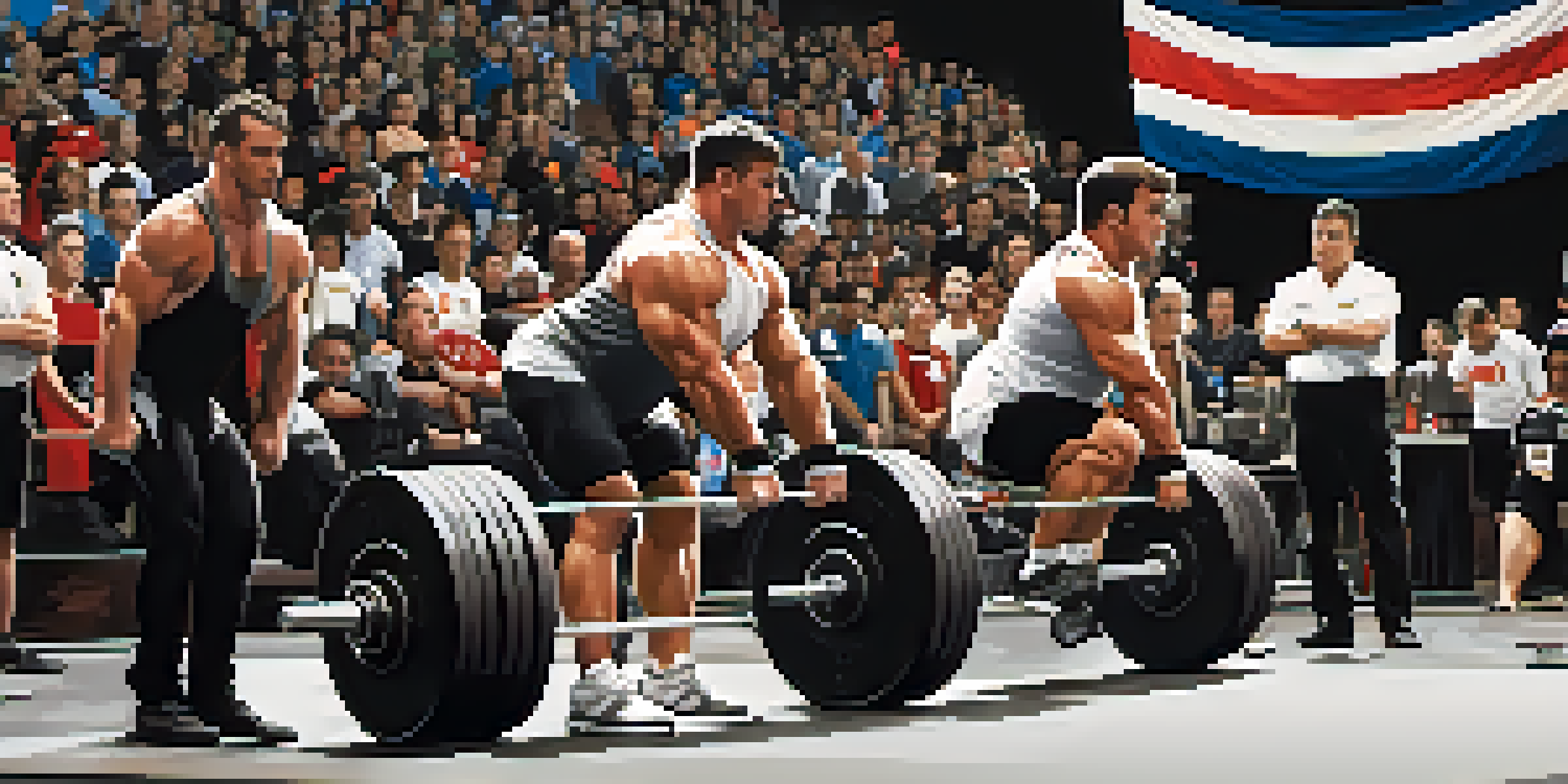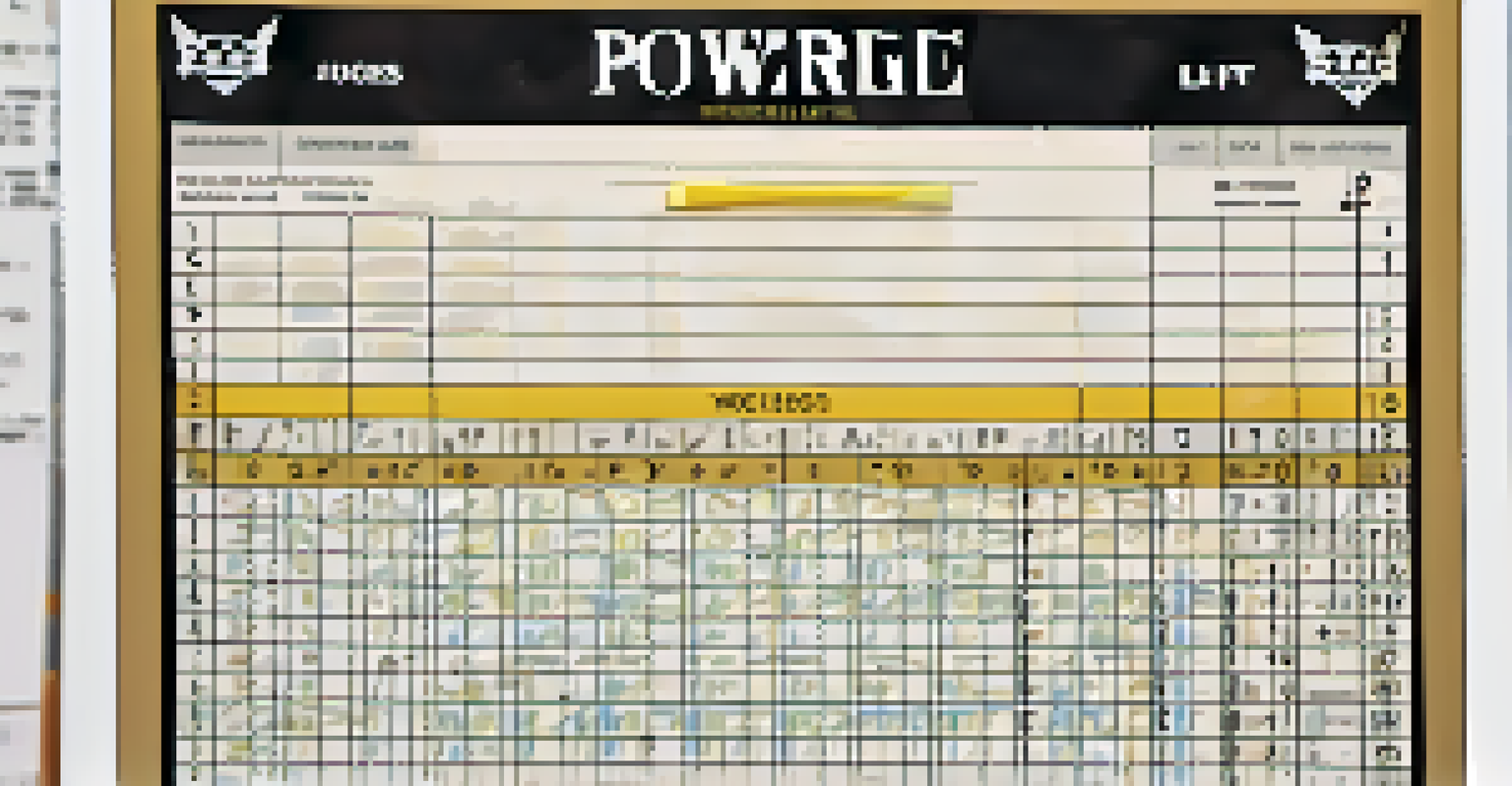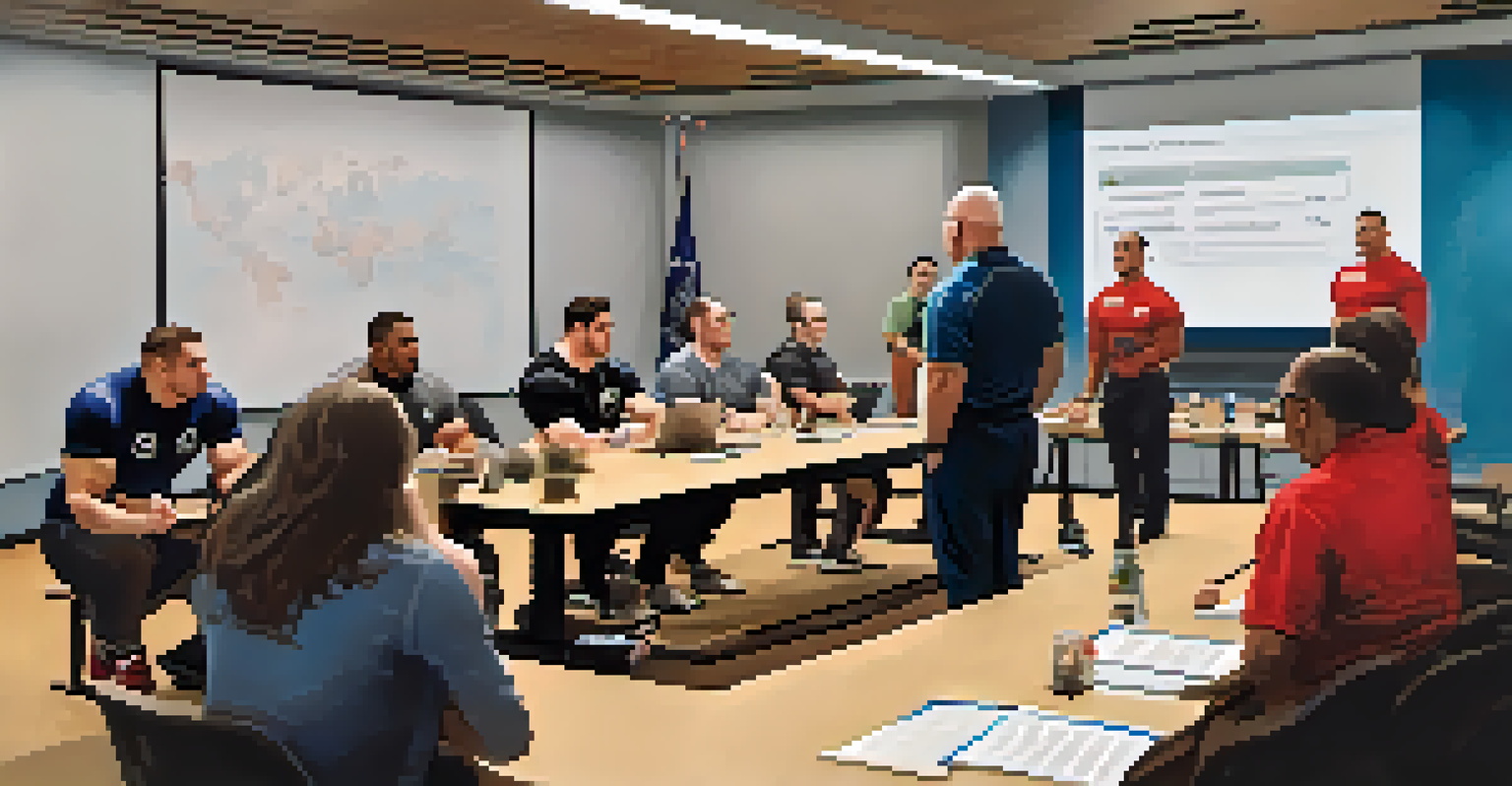The Role of Judges in Powerlifting Scoring Explained

What Judges Do in Powerlifting Competitions
Judges play a vital role in powerlifting competitions, ensuring that every lift is evaluated fairly and according to established rules. They are responsible for making critical decisions on whether a lift is successful or failed based on specific criteria. This not only maintains the integrity of the sport but also guarantees that all athletes compete under the same standards.
Judging is not just about making decisions, it's about understanding the essence of the sport and ensuring fairness for all competitors.
In each event, judges observe the lifter's technique, form, and adherence to rules like depth in squats or lockout in deadlifts. Each judge has a unique vantage point, allowing them to assess the lift from different angles. This collective observation helps in arriving at a fair result, minimizing biases that could arise if only one person were judging.
Ultimately, judges ensure that the competition is not only fair but also encourages lifters to push their limits while adhering to safety protocols. Their expertise and knowledge of the sport are essential for safeguarding the athletes' well-being and the competition's overall credibility.
The Scoring Process in Powerlifting
Scoring in powerlifting is a structured process that relies heavily on judges' evaluations. Each lift is rated as either successful or unsuccessful based on specific criteria, and the cumulative total of successful lifts determines the athlete's final score. This straightforward scoring system ensures that every lift contributes to the overall performance, making every attempt crucial.

Judges use a scoring card to record their decisions, where each lift must meet certain technical standards. For example, a squat must be performed to a depth where the hip crease is below the knee, and the lifter must maintain control throughout the lift. This level of scrutiny ensures that only lifts meeting all criteria are counted towards the athlete's total.
Judges Ensure Fair Competition
Judges play a crucial role in maintaining the integrity of powerlifting by evaluating lifts according to established rules and criteria.
After all lifts are completed, the scores are tallied, and ties are often resolved by the lifter's body weight. This method underscores the importance of not only lifting heavy weights but also doing so with precision and technique. The blend of strategy and execution makes powerlifting an exciting sport to watch and participate in.
Criteria Used by Judges in Evaluating Lifts
Judges evaluate lifts based on a set of clear criteria that emphasize safety and proper technique. For instance, in the squat, the lifter must demonstrate control and depth, while in the bench press, the bar must touch the chest before being pressed up. These criteria ensure that all lifts are performed within the sport's safety standards.
A judge's role is pivotal in any sport, for without them, the competition would lack integrity and trust.
Each lift is judged on its own merits, with specific faults leading to a 'no lift' call from the judges. Common reasons for a failed lift include improper form, lack of control, or not completing the lift within the established time limits. Judges must be vigilant and consistent, as their calls can greatly affect the athletes' outcomes.
Furthermore, it's essential for judges to communicate these criteria clearly to the athletes before the competition. This transparency helps competitors understand what is expected of them and can influence their approach during their attempts. By setting these standards, judges help create a level playing field for all lifters involved.
The Importance of Judge Training and Certification
Training and certification for judges in powerlifting are crucial for maintaining a fair and consistent judging process. Judges must undergo rigorous training to understand the rules and scoring criteria thoroughly. This educational component ensures that they are well-prepared to make quick and effective decisions during competitions.
Certification often involves passing tests that assess knowledge of the sport's rules and practical judging scenarios. Many organizations require judges to stay updated with any changes in regulations, emphasizing the importance of continuous education. This commitment to improvement helps judges provide accurate evaluations and uphold the sport's integrity.
Scoring Relies on Judge Evaluations
The scoring process in powerlifting is based on judges' assessments of successful lifts, making every attempt vital for an athlete's total score.
In addition to technical knowledge, judges also develop soft skills, such as communication and conflict resolution, which are vital during events. Their ability to explain decisions clearly and maintain a calm demeanor can help manage tense situations, making for a smoother competition experience for everyone involved.
Judges' Influence on Athlete Performance
Judges can significantly influence athlete performance, as their decisions directly impact the outcome of lifts. Athletes often feel pressure to perform under the watchful eyes of judges, which can motivate them to excel or create anxiety. This dynamic adds a psychological element to powerlifting, where mental fortitude is as critical as physical strength.
Moreover, the feedback provided by judges can help athletes refine their techniques. Constructive criticism allows lifters to identify areas for improvement, whether it be in their form or execution. This ongoing dialogue between judges and athletes fosters a learning environment, encouraging competitors to develop their skills.
Ultimately, the relationship between judges and athletes is symbiotic; judges uphold the sport's standards while athletes push the boundaries of what is possible. This collaboration ensures the sport remains competitive and fair, enriching the overall powerlifting experience for everyone involved.
Common Misconceptions About Judging in Powerlifting
There are several misconceptions about the role of judges in powerlifting that can lead to misunderstandings among competitors and fans alike. One common myth is that judges are biased or that they favor certain athletes, which undermines the integrity of their evaluations. In reality, judges are trained professionals dedicated to maintaining fairness and objectivity in every competition.
Another misconception is that judges have the final say on the rules, when in fact, they are bound by the guidelines set forth by governing bodies. These organizations provide detailed rulebooks that judges must adhere to, ensuring consistency across competitions. This structure is in place to promote transparency and accountability, so that all athletes are judged by the same standards.
Training Enhances Judge Effectiveness
Rigorous training and certification ensure judges are knowledgeable and prepared, helping them provide consistent and fair evaluations during competitions.
Lastly, some people may believe that judging is a simple task, but it requires immense focus, knowledge, and quick decision-making. Each lift is unique, and judges must be prepared to assess a wide range of factors in a matter of seconds. By dispelling these myths, we can foster a greater appreciation for the hard work judges put into their roles.
The Future of Judging in Powerlifting
As powerlifting continues to grow in popularity, the role of judges is evolving to meet new challenges and expectations. Innovations in technology, such as video reviews and real-time scoring systems, are being introduced to enhance the judging process. These advancements aim to provide greater accuracy and transparency in scoring, which can benefit both athletes and spectators.
Judges are also being encouraged to engage more with the powerlifting community through workshops and seminars. This involvement helps to foster a sense of camaraderie and allows judges to stay connected with athletes' needs and concerns. As judges continue to evolve their skills, they contribute to a more supportive and informed environment for all participants.

Looking ahead, the collaboration between judges, athletes, and organizations will be crucial in shaping the future of powerlifting. By embracing change and focusing on continuous improvement, judges can ensure that the sport remains fair, exciting, and accessible for future generations of lifters.